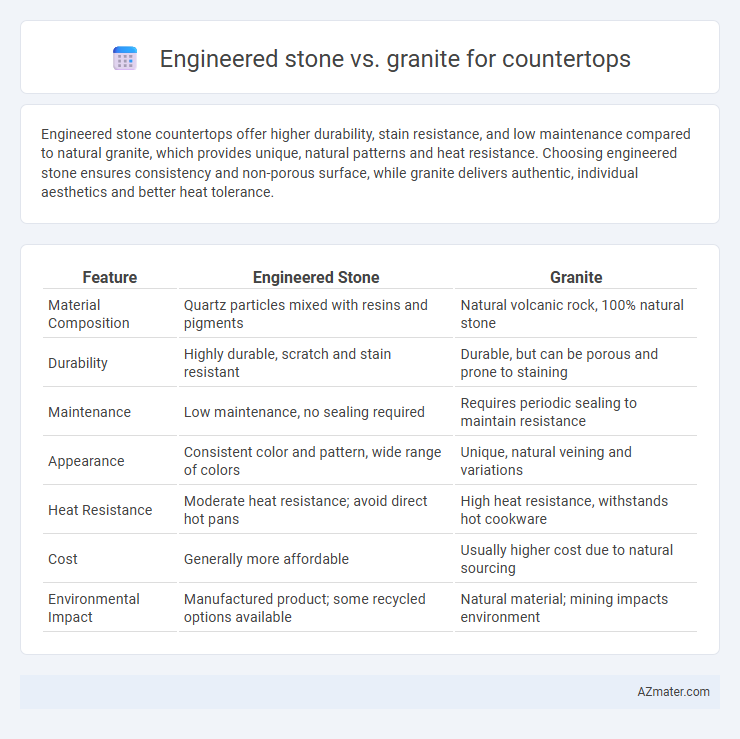Engineered stone countertops offer higher durability, stain resistance, and low maintenance compared to natural granite, which provides unique, natural patterns and heat resistance. Choosing engineered stone ensures consistency and non-porous surface, while granite delivers authentic, individual aesthetics and better heat tolerance.
Table of Comparison
| Feature | Engineered Stone | Granite |
|---|---|---|
| Material Composition | Quartz particles mixed with resins and pigments | Natural volcanic rock, 100% natural stone |
| Durability | Highly durable, scratch and stain resistant | Durable, but can be porous and prone to staining |
| Maintenance | Low maintenance, no sealing required | Requires periodic sealing to maintain resistance |
| Appearance | Consistent color and pattern, wide range of colors | Unique, natural veining and variations |
| Heat Resistance | Moderate heat resistance; avoid direct hot pans | High heat resistance, withstands hot cookware |
| Cost | Generally more affordable | Usually higher cost due to natural sourcing |
| Environmental Impact | Manufactured product; some recycled options available | Natural material; mining impacts environment |
Introduction to Engineered Stone and Granite Countertops
Engineered stone countertops consist of natural quartz crystals combined with resin and pigments, offering uniform appearance, enhanced durability, and low maintenance compared to natural stone. Granite countertops are natural igneous rock slabs prized for unique patterns, heat resistance, and scratch tolerance but require periodic sealing to prevent stains. Both materials provide strong, stylish surfaces ideal for kitchen and bathroom use, with engineered stone excelling in consistency and granite favored for its natural variation.
Composition and Manufacturing Differences
Engineered stone countertops consist primarily of crushed quartz mixed with resin and pigments, creating a non-porous surface that resists stains and scratches better than natural granite. Granite is a natural igneous rock formed from cooled magma, composed mainly of quartz, feldspar, and mica, which requires sealing due to its porous nature. The manufacturing process of engineered stone involves blending raw materials and curing under heat and pressure, offering uniform patterns, while granite is quarried and cut into slabs with unique, natural veining.
Appearance and Design Variety
Engineered stone offers a broader range of colors and patterns, mimicking natural stone or showcasing unique designs with more uniformity than granite. Granite features distinctive, natural veining and speckles that create one-of-a-kind countertops with varied texture and depth. Homeowners seeking personalized aesthetics benefit from engineered stone's consistent finish, while those preferring the authenticity of nature often choose granite's organic and timeless appearance.
Durability and Strength Comparison
Engineered stone countertops exhibit superior durability due to their non-porous surface, making them highly resistant to stains, scratches, and impact compared to natural granite. Granite, while exceptionally strong and heat-resistant, is more prone to chipping and requires periodic sealing to maintain its integrity against moisture and staining. Both materials offer robust strength for kitchen use, but engineered stone provides enhanced long-term resilience and low maintenance.
Maintenance and Cleaning Requirements
Engineered stone countertops require low maintenance due to their non-porous surface, which resists stains and does not need sealing, making cleaning simple with mild soap and water. Granite countertops, being porous natural stone, demand periodic sealing to prevent staining and bacterial growth, and cleaning requires pH-balanced cleaners to avoid surface damage. Both materials offer durability, but engineered stone provides easier upkeep and consistent resistance to everyday kitchen spills.
Stain and Heat Resistance
Engineered stone countertops offer superior stain resistance due to their non-porous surface, preventing liquids and oils from penetrating and causing discoloration compared to natural granite. Granite, being a natural stone with inherent pores, requires regular sealing to maintain its stain resistance effectively. In terms of heat resistance, granite can withstand higher temperatures without damage, while engineered stone may be susceptible to heat-induced discoloration or cracking when exposed to hot pots or pans.
Environmental Impact and Sustainability
Engineered stone countertops offer a more sustainable option compared to granite due to their use of recycled materials and lower quarrying impact. Granite extraction involves extensive mining that disrupts ecosystems and generates significant waste, whereas engineered stone manufacturing optimizes raw material usage and reduces landfill contributions. The longevity and non-porous nature of engineered stone also contribute to reduced maintenance and chemical use, enhancing its environmental benefits over granite.
Cost and Value Considerations
Engineered stone countertops typically cost between $50 to $100 per square foot, offering a more affordable option compared to granite, which ranges from $60 to $120 per square foot depending on quality and origin. Engineered stone provides consistent patterns and colors with lower maintenance costs, while granite offers unique natural patterns that can increase home resale value despite higher upkeep. Investing in engineered stone balances upfront savings with durability, whereas granite's premium price can yield greater long-term value in high-end properties.
Installation Process Differences
Engineered stone countertops offer a more straightforward installation process due to their uniform slab sizes and pre-fabricated edges, reducing the need for on-site cutting and shaping compared to granite. Granite installation requires skilled labor for measuring, cutting, and fitting irregular slab patterns and natural fissures, often resulting in longer installation times. Engineered stone also allows for easier customization and faster sealing, while granite demands meticulous sealing and maintenance after installation to prevent staining and damage.
Which Countertop Material is Right for You?
Engineered stone countertops offer non-porous surfaces that resist staining and require low maintenance compared to granite, which is a natural stone known for its unique patterns and durability but needs periodic sealing. When choosing the right countertop material, consider factors like budget, lifestyle, and aesthetic preferences; engineered stone is ideal for modern kitchens demanding consistent color and easy upkeep, while granite suits those seeking natural variation and heat resistance. Evaluating durability, maintenance needs, and design will help determine whether engineered stone or granite best fits your kitchen requirements.

Infographic: Engineered stone vs Granite for Countertop
 azmater.com
azmater.com